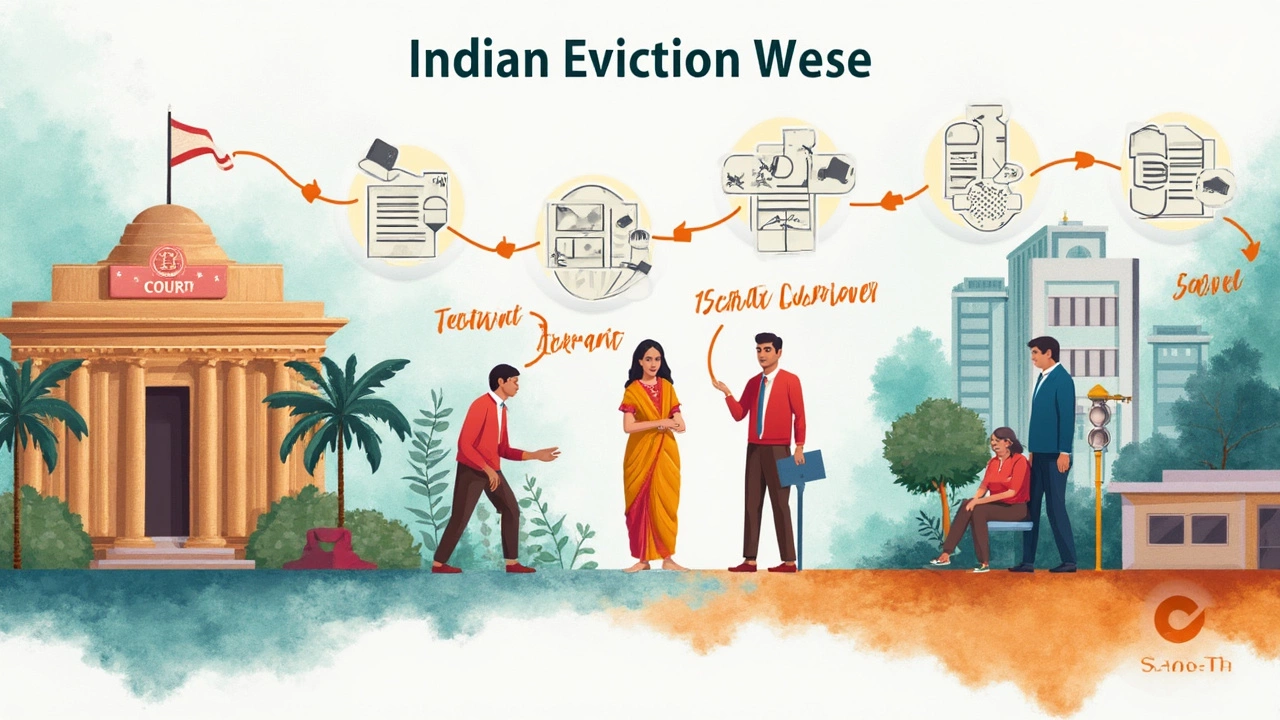So, your tenant has stopped paying rent and you’re stuck wondering, “Now what?” You’re not alone—this actually comes up more often than you’d think, especially in cities like Mumbai, Delhi, and Bangalore, where the rental scene can get pretty wild. But here’s the thing: you can’t just kick a tenant out overnight, no matter how frustrating it gets. Indian law is pretty clear—both tenants and landlords have their rights.
The first thing you need to know is that not paying rent isn’t a free pass for tenants. Under most rent agreements, missing payments can be grounds for big trouble, but landlords have to follow the law step by step. If you mess this up, you could end up waiting even longer to sort things out. That’s why knowing what really happens when someone refuses to pay rent in India is super important, whether you’re a tenant trying to buy time—or a landlord who’s fed up with excuses.
Stick around as we walk through what usually happens first, what actions the landlord can legally take, and how courts deal with these cases. You’ll pick up some practical tips and learn how to dodge classic rental arguments, whether you’re renting out your place, or living in one. This stuff matters—nobody wants their home (or income) hanging by a thread.
- Is It Common for Tenants to Refuse Rent?
- Landlord’s First Steps After Non-Payment
- Legal Notice and Court—How the Process Works
- Eviction Timeline: What to Expect
- How to Avoid Rental Disputes
Is It Common for Tenants to Refuse Rent?
If you think tenants habitually refuse rent in India, you might be surprised—outright refusal isn't as common as late payments or delayed transfers. Most tenants do pay up, but with skyrocketing rent in places like Mumbai and Bengaluru, payment delays are definitely rising. According to a 2023 report by Magicbricks, around 12% of landlords reported having problems collecting full rent on time during the last year, especially after the pandemic squeezed everyone’s wallets.
Refusal to pay often comes up not because a tenant is dodgy, but because of job loss, medical bills, or arguments over needed repairs. A lot of the time, it’s not just an ‘I won’t pay’ situation—it’s ‘I can’t pay right now,’ or ‘I don’t think I should pay until you fix the plumbing.’ Keep in mind, rent agreements rarely allow tenants to just withhold rent. If there’s a valid dispute—say, the flat turns into a swimming pool in monsoon and nobody’s fixing it—that’s a different story, but the law is still clear.
| City | Average Cases of Rent Disputes (2023) |
|---|---|
| Mumbai | 1 in 15 rentals |
| Delhi | 1 in 20 rentals |
| Bangalore | 1 in 18 rentals |
Some states have rent control acts which sound protective but actually make it harder to evict someone, even if they stop paying. That means disputes can drag out. If you’re a landlord, don’t skip background checks. And tenants—always get receipts for payments and keep records of chats with your landlord.
Bottom line: full-on refusal isn’t a daily problem in the market, but delayed or partial payments happen way more often than most people admit. Regardless, rent dispute India issues are rising as housing gets pricier and relationships get more formal (and, honestly, tense). Knowing your rights and having everything in writing saves a ton of headaches on both sides.
Landlord’s First Steps After Non-Payment
If a tenant misses a rent payment, don’t rush to change the locks or call the police. In India, landlords need to stick to the legal process, otherwise things can backfire quickly. You have to play by the rules, even when your patience is running thin.
First, double-check the rent agreement. Most contracts have a grace period, usually five to ten days after the due date, before it officially counts as a missed payment. If that window has passed and there’s still no rent, reach out to the tenant. Sometimes, a direct conversation clears things up – maybe the delay was a simple mistake or technical hiccup.
But if the tenant doesn’t pay up after you ask, it’s time to put it in writing. Serve a legal notice—yes, an actual letter, not just a WhatsApp message—demanding the pending rent within a set deadline, normally 15 days. This step isn’t just formality; Indian courts want proof you tried to resolve things before going nuclear.
"Serving a legal notice is not optional. Without this, courts will often dismiss a landlord’s claims straight away," says attorney Vikas Goel, who handles rent dispute India cases daily.
Here’s what you need to put in that notice:
- Date and amount of overdue rent
- Reference to the rental agreement or lease
- Deadline for tenant to pay or explain the delay
- A warning that failure means legal action (like eviction or recovering dues)
Many tenants cough up as soon as they see a formal letter headed their way. But if you do have to escalate, having this paperwork is crucial.
For perspective, check out the typical timeline for starting action after a missed payment:
| Step | Usual Time Frame |
|---|---|
| Rent due date missed | Day 1 |
| Informal reminder (call/text) | Day 2-5 |
| Formal legal notice sent | Day 7-14 |
| Deadline in legal notice ends | Usually Day 21-30 |
Quick tip—always keep proof of communication. Send the legal notice by registered post or via an advocate. Screenshots of messages or emails won’t really help you in court if things get ugly.

Legal Notice and Court—How the Process Works
So, if the tenant’s been dodging rent for a while, what’s a landlord’s next step? The law says you can’t just lock the door. Instead, the first real move is to send a formal legal notice. It’s usually a lawyer who drafts this, but you can also find templates online for basic stuff. The notice must clearly state the overdue rent, the total outstanding amount, and give the tenant a set deadline—typically 15 to 30 days—to pay up or vacate.
If the tenant ignores the legal notice, it’s time to take it to the next level: filing a case in court. But here’s why it can get annoying—courts in India aren’t always speedy. From 2022 data, it takes on average about 3 to 6 months for the court just to hear an eviction matter in major cities, and complex disputes can drag on way longer.
| Step | Who Takes Action | Timeline |
|---|---|---|
| Send Legal Notice | Landlord/Advocate | 0-1 month |
| Wait for Tenant Response | Tenant | 15-30 days |
| File Eviction Suit | Landlord/Advocate | Next 1-2 months |
| Court Proceedings | Court | 3-18 months |
Here’s what’s actually involved when you take a rent dispute to court:
- Landlord files an eviction petition under the relevant Rent Control Act (each state has its own version, so check your state’s rules).
- Both sides get a chance to present their story. The tenant can explain why they haven’t paid—sometimes it’s due to property issues or deposit fights.
- If the court sees the tenant genuinely hasn’t paid and has no good reason, it might order the tenant to pay up or vacate the place.
Now, if the court rules in the landlord’s favor, they’ll usually give a little extra time for the tenant to move out, typically 30 to 60 days. But tenants have the right to appeal, which can stretch things further.
And here’s a tip: keep every bit of paperwork—rent receipts, messages, and especially the legal notice. Courts often want proof the landlord didn’t act out of the blue. If you’re on the tenant side, save evidence showing you’ve tried to settle things or fix the dispute. This goes a long way in court.
All this process centers around rent dispute India cases, which are among the most common types clogging up civil courts, especially in cities with tight housing and high rents.
Eviction Timeline: What to Expect
The eviction process in India isn’t quick. If a tenant refuses to pay rent, most landlords hope to settle things quietly—but when talks break down, the legal stuff begins. Here’s what really happens, step by step.
- Legal Notice: The landlord sends a legal notice, usually giving the tenant 15 days (sometimes 30, depending on your agreement) to pay up or vacate. A lot of states and rent control acts actually require this; skipping it can mess up your whole case later.
- Filing in Court: If the tenant ignores the notice, the landlord files an eviction suit in the local rent control court or small causes court. Now the clock starts ticking, but it’s not ticking fast.
- Hearing and Defense: Both sides get a chance to talk. Tenants often use this step to delay—so expect more time here, especially if they bring up counter-complaints or claim repairs weren’t done.
- Court Decision: This can take anywhere from 4 months to 2 years, depending on your city and the court’s workload. Bigger cities usually take longer.
- Vacate Order and Police Help: If the landlord wins, the court gives a vacate order. Tenants get another short window (often 30 days) to move out on their own. If they still don’t budge, the police or a court officer can step in to help.
If you’re wondering how long the whole thing usually drags out, check this out:
| City | Average Eviction Time |
|---|---|
| Mumbai | 1.5 – 3 years |
| Delhi | 1 – 2 years |
| Bangalore | 8 months – 1.5 years |
| Smaller towns | 6 months – 1 year |
Why so long? Most delays happen because of slow courts and tenants using every trick in the book to buy time. This is why rock-solid paperwork matters—if your rental agreement is vague or missing, things get messier and take even longer.
One thing to keep in mind: You can’t just lock out a tenant or toss their stuff—doing that can land landlords in real trouble with the law, even criminal charges. Stick to the rent dispute India process, even when patience is running thin.

How to Avoid Rental Disputes
The headaches from rent disputes aren’t worth it. Whether you’re a landlord or tenant, there are simple, proven steps to help everyone stay on the same page and avoid dragging things to court. In India’s crowded rental market, even small misunderstandings can blow up fast, so it pays to be smart from the start.
The biggest game-changer? Always have a clear, written rent agreement. This should spell out the rent amount, due date, security deposit, what happens if the rent isn’t paid, notice period, and even things like who handles repairs. Don’t trust promises or WhatsApp messages—get it all on paper and register the agreement if possible. Did you know, according to a 2023 survey by Magicbricks, over 60% of disputes happened when there was no written rental agreement?
- Document Everything: Whenever money changes hands (like rent or deposit), swap receipts. Always use bank transfers if you can, so there’s a record.
- Regular Communication: Landlords—don’t disappear after handing over the keys. A simple monthly text or call can sort out small issues before they turn big.
- Follow the Law: Learn your city’s rent laws. Some cities like Mumbai and Chennai have specific rules on tenant eviction and security deposits. Don’t assume “my friend told me” is the same as what the law says.
- Keep Repairs Updated: Tenants often stop paying if the place falls apart and complaints aren’t fixed. A quick fix now beats a giant fight later.
- On-Time Payments: Tenants, set a reminder for the rent date. Most landlords won’t fuss if you’re a couple of days late once or twice, but make it a habit and trust flies out the window.
If things get tense, consider a neutral third party. Some cities in India now offer rental dispute mediation, which is way cheaper and faster than court.
| Common Dispute Source | % of Disputes (India, 2023) | How to Prevent |
|---|---|---|
| No written agreement | 61% | Register and sign every agreement |
| Deposit refund | 22% | Clear deposit terms up front, keep records |
| Repairs not done | 10% | Document repair responsibilities |
| Rent hike or delay | 7% | Agree on notice period and increases in writing |
When everyone sticks to the rules, chances are you’ll never end up googling “tenant rights India” at 2 AM because of a nasty argument. Clear agreements, good communication, and a bit of planning—the best insurance in India’s rental world.
